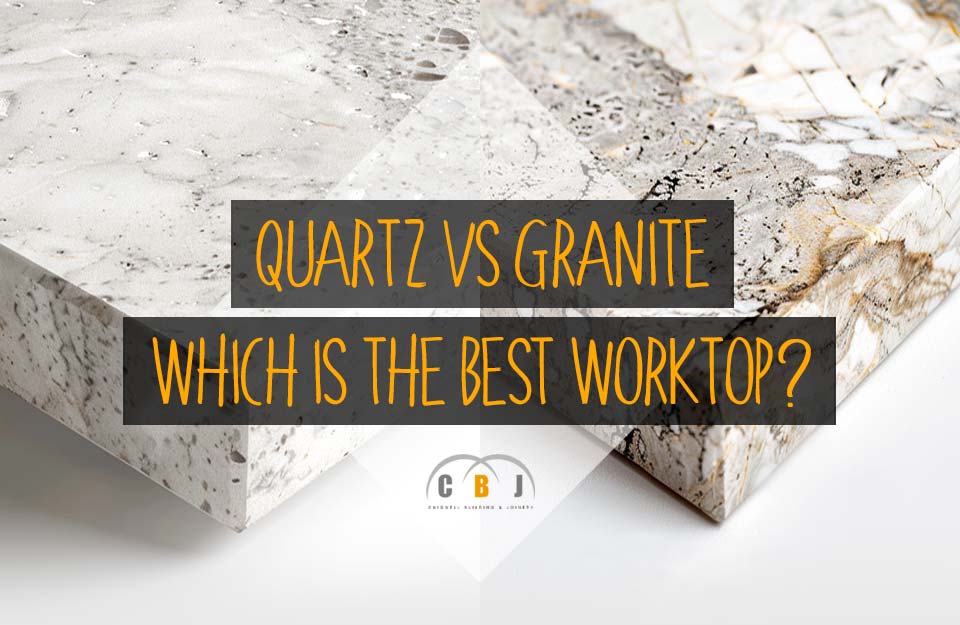
Quartz vs Granite - Which is the Best Worktop?
Author Chigwell Building & Joinery
Date 01/08/24
Both quartz and granite are top options when it comes to kitchen worktops.
Many people in fact are unsure whether to choose one or the other.
First off, the differences between them are somewhat minimal.
Additionally, most people will not be that knowledgeable about why one might be better than the other in certain aspects.
In this guide we shall discuss both of these materials in more detail so as to allow you to make a better-informed decision.
Table of Contents
- Key Differences Between Quartz & Granite
- Origin
- Appearance
- Imperfections
- Durability
- Stain Resistance
- Mark & Scratch Resistance
- Maintenance & Care
- Heat Resistance
- Strength
- Longevity
- Water Resistance
- Design
- Installation
- Cost
- Conclusion
Key Differences Between Quartz & Granite
The primary difference between quartz and granite is that quartz is manmade whilst granite is a naturally occurring organic material.
Hence every piece of granite is unique and distinct from any other.
On the other hand, quartz is more artificial in its formation since it is formed from a mixture of naturally occurring quartz, polyester resin, and pigments.
Another difference is that quartz is slightly harder than granite.
Quartz has a rating of 7 on the Mohs hardness scale whereas granite has a rating of 6.
Quartz is available in practically any colour you desire and is also customisable since it is a manmade material.
Granite is also available in several colours and patterns but you cannot customise it as it is a natural material.
Origin
Granite is mined and it is a 100% natural pure stone.
It is quarried from the earth in large boulders and then gets divided into individual slabs and polished.
Granite occurs in a natural way; formed by the cooling of deep volcanic magma.
Hence each slab will be unique and distinct.
Quartz may look natural but in reality, it is not.
Quartz is crushed and then mixed with polymer resins which act as a binding agent along with colour pigments.
Following this mixture, quartz is extremely hard and strong.
The formulation is typically 93% quartz and 7% resin.
While there are countless patterns and colours to choose from unlike granite these are completely artificial not natural.
Appearance
Needless to say, both granite and quartz are very aesthetically pleasing.
They make the kitchen look more elegant and sophisticated.
They come in various colours and tones but as mentioned earlier granite has a natural pattern and colour whereas the pattern of quartz is manmade and customisable.
Granite is a natural beauty with various tones ranging from earthly ones to greener ones.
They blend beautifully with kitchen interiors.
Having said that, imperfections might be present in granite slabs since they are not manufactured artificially.
If you are looking for uniqueness then any imperfections will probably be insignificant for you.
On the other hand, quartz is a manufactured material and consequently, the designs are man-made albeit still appealing.
You will find more colours to choose from and quartz is generally a bit more glossy than granite.
It is important to bear in mind that quartz worktops should not be exposed to direct sunlight as they may start to discolour after prolonged exposure.
Imperfections
As previously mentioned since granite is a natural material it is bound to have certain imperfections.
However, such imperfections are welcomed as they offer a certain uniqueness to granite worktops.
Quartz on the other hand is more consistent and uniform.
Hence if you do not wish to have any kind of imperfections you should opt for quartz.
Durability
Both granite and quartz are very strong and extremely durable materials.
Granite is a very hard substance and scratches are not a problem.
It is also worth noting that granite will never depreciate in value and hence if you invest in such a worktop you can expect it to boost the value of the property.
Quartz is also extremely durable and one can say that it has the same thickness as granite.
It will not crack or chip.
However one may wish to note that despite this quartz worktops do not come with a lifetime guarantee.
If we were to say whether one of them is more durable than the other then quartz would be the answer as it is less prone to chipping than granite.
Stain Resistance
Granite is a porous stone.
However, stains are absolutely not a problem when it comes to granite worktops because granite will not absorb liquids as it will have been sealed.
Quartz is non-porous and hence it is virtually stain proof.
There are no capillary channels between the minerals.
Hence there is no risk that any spills will stain it.
Quartz is relatively better when it comes to stain resistance as granite will need sealing in order to be stain resistant as otherwise it would absorb any spills and stain.
Mark & Scratch Resistance
Both granite and quartz are very strong and durable.
You do not need to worry about marks and scratches ruining your countertops as both quartz and granite are highly scratch-resistant materials.
If you were to compare them to each other granite is more scratch and mark resistant than quartz.
Obviously, one will need to exercise caution as much as possible when cleaning and placing any utensils directly onto the worktops.
But chipping, scratching, and similar damages are not common with either granite or quartz.
Maintenance & Care
When it comes to cleaning and maintenance it is crucial to avoid using anything that is abrasive on granite and quartz.
Anything containing chemicals such as alkaline-based cleaning products or chlorine should be avoided as they might cause damage.
It is best to stick to warm soapy water when cleaning granite or quartz countertops.
Always opt for a PH neutral detergent and use a soft cloth.
It is also best to wipe it afterwards with a chamois leather cloth so as to dry it and remove any streaks.
Heat Resistance
Granite has very good heat resistance properties.
Thus it can handle high amounts of heat fairly well.
It can withstand being close to the cooker and even any hot pot that may have been placed on it for some time.
You will not have to worry that it will weaken or get damaged.
Quartz worktops are also relatively heat resistant.
However, you should avoid placing any hot pots or pans on a quartz worktop surface.
This could lead to what is referred to as a thermal shock and fracturing might result.
Having said that quartz can take temperatures over 250 degrees Celsius so you do not need to worry if it is installed against a hob.
Strength
There is no doubt that both granite and quartz are extremely strong and durable so whichever one you opt for there is no need to worry as they will offer you strength and longevity.
Having said that quartz is even stronger than granite relatively speaking. It is also heavier than granite.
Longevity
It is important to point out that while both granite and quartz are durable if we were to talk about longevity we would need to factor in other aspects.
For instance, as granite is a porous material sealing it well when it is installed is of the essence.
The sealing should also undergo a re-treatment every now and then as otherwise etching might occur.
This means that acids such as vinegar, tomato sauce, and lemonade spillages could mark the granite.
It is a good idea to splash some water on the countertop so as to see whether it gets absorbed or repelled.
If the granite looks dull instead of somewhat glossy then it means that it is time to reseal it.
Additionally, it is important to ensure that the worktops are cleaned properly and regularly.
Non-abrasive cleaning products should be used.
Quartz countertops will rank better than granite countertops when it comes to longevity.
This is mainly attributed to the fact that quartz is a non-porous material and consequently, it does not need sealing like granite.
It is also virtually maintenance-free.
Water Resistance
Both quartz and granite perform well when it comes to water resistance.
However, it is crucial to note that granite needs to be sealed well upon installation as otherwise, it is a porous material.
Moreover, resealing will be needed after a number of years.
Thus quartz, which is a non-porous material, outranks granite in terms of water resistance.
In this case, there is no need for sealing and hence this is one of the main advantages of quartz over granite.
Design
Quartz can be manufactured in various patterns, colours, and sizes.
So when it comes to choice and design flexibility quartz, one can say that quartz would outrank granite.
The latter comes in a more limited variety when it comes to dimensions and as noted earlier the patterns are natural.
Hence one would have to choose from patterns and colours that occurred naturally rather than stating exactly what he or she prefers.
Installation
Professional installation that ensures accuracy is a must for both quartz and granite.
Both materials will come at a rather high price, and being a long term investment that will add value to your kitchen and to your home in general, you want to make sure that they are properly installed.
In both cases the slabs will need to be cut precisely and so a very accurate template for each part of the worktop is of the essence.
The templates will also need to factor in any nooks and recesses.
You will also need to factor in the handling, transportation, proper positioning and stabilising.
A number of people will be required to take care of these processes which are all essential for proper installation.
Besides good teamwork and plenty of strength, it is crucial that a great deal of care and safety measures are used to prevent any damages to the granite or quartz.
Cost
One of the primary considerations when installing kitchen worktops is the cost.
Both granite and quartz are rather pricey.
Since this is a long term investment and you are getting high quality material, you can expect this.
Granite prices will vary depending on the quality you opt for.
Better quality granite will be more resistant to chipping and scratching than the cheapest granite that you will find on the market.
The availability or supply will also have an impact on the price as some granite types are more difficult to find, and consequently they will come at a higher price.
While quartz also comes at a hefty price, its price has gone down over the past few years and it will generally be relatively cheaper to opt for quartz instead of granite.
This will depend on the colour choice and availability too.
You will also need to take into account additional fabrication costs for both quartz and granite.
These include drainer grooves, upstands and inset sinks.
Conclusion
Both granite and quartz are considered to be top choices for kitchen worktops as they are enduringly durable and stylish.
The main drawback of granite is that it is porous and more sustainable to staining than quartz.
On the other hand, quartz can get damaged if exposed to excessively high temperatures.
Other than that one can safely say that they are both aesthetically pleasing, available in colours and patterns to suit any preference, and very durable.
We hope that this guide provided you with more insight about these two materials.
But ultimately, whether you choose one or the other, you can rest assured that both of them offer good value for money, very good longevity and peace of mind.

